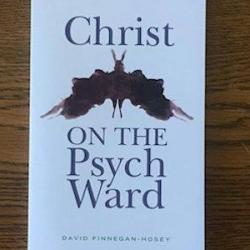When we admit that mental illness has been a factor in many of the mass shootings that have happened, we are confronted with a moral crisis. As someone who takes pills every morning to make my mind work, I have often concluded that the world is divided between people who take mental health pills and those who don’t. People who don’t take these pills live in a world where a morality of individual responsibility works. Good choices get rewarded; bad choices get punished; and there’s no reason to blame anyone else for your bad choices. But when you go through the experience of actually losing your mind, that moral system crumbles and you face a true existential crisis.
Many Christians bemoan the fact that our world no longer calls people right or wrong, but says instead that they are sick or healthy. In the old days, the nuns would just smack your hand with a ruler if you squirmed too much in your seat; now the teachers send you to a psychologist. Parents are ushered into school meetings where instead of reporting their kids’ “misbehavior” for which consequences can be meted out, the teacher, principal, school psychologist, and occupational therapist share their theories about which syndrome their child can be tested for.
It smells like the same kind of “secular humanism” which says we should stop putting drug abusers in jail and give them therapy instead. On one level I agree with that; it’s absurd to throw poor kids in jail for smoking a blunt so that they’ll intermingle with kids who got in more serious trouble and get corrupted even further. But there’s something offensive about the fact that nobody can be right or wrong anymore. It smells like a compromise of the truth, a “moral relativism.”
Of course, when I remember my own story, I have to admit there was a time when I really was helpless. If you’ve never experienced being depressed for no reason, you won’t believe me when I say that there were several months when I really couldn’t do anything. There’s no way to describe it in words that won’t sound like wallowing in self-pity or navel-gazing. I can’t explain why, but at a job I held briefly in my early twenties, I would go into my work, turn on my computer, stare at the screen for hours, and then go home. Because of the nature of my position at the time, my complete incapacity didn’t trigger any red flags. And that became part of the depression: the overwhelming weight of guilt. There was actually a tremendous psychosomatic weight in my chest. It was like having a lead medallion inside my heart.
When I see people who are unproductive in the workplace, it’s very hard to judge them because of what I went through. Again, it probably sounds like I was just “beating myself up” or “focusing all of my attention on myself.” I certainly had those accusations in my mind as a part of that strange, bewildering experience. But the blessing of that season of accursedness was that it left me with was a new moral system.
Instead of defining morality on the axis of right vs. wrong, I define it now on the axis of dependence vs. self-reliance. There are those who recognize that they can do nothing without God and those who need for our world to be a meritocracy in which those who do what’s right get rewarded and those who do what’s wrong get punished. I’m not sure exactly how to distinguish between the healthy dependence in which God’s strength is made perfect in our weakness and the unhealthy dependency of an ungrateful freeloader who cynically exploits the mercy of others, except to say that denial is at play in the latter in a way that it isn’t in the former. Perhaps the healthy dependence has discovered the joy of receiving the gifts of God and being grateful for every opportunity to gain meaning and taste God’s mercy more deeply through serving Him and other people.
What I know is that the more I learn not to view the world as a meritocracy, the more I am able to face my flaws with integrity and ask God for deliverance from them. The ultimate moral question then is not whether we are responsible people; it is whether we are vulnerable people who have been broken and blessed by God for the sake of sharing His mercy with others. There is certainly a right and a wrong in the universe, but it has less to do with obeying an abstract list of “Thou shalts” and “Thou shalt nots” and more to do with gaining a foundational disposition of grateful worship to our Creator and generous mercy to our fellow humans.
Our gratitude and mercy will not prevent people with broken minds from doing horrible things, but it’s still the best that we can do and the basic structure of the peaceable kingdom that God offers as a remedy to those who wish to flee a violent, ruthlessly competitive world. Do not disdain the needs of the mentally ill. When they are loved and nurtured despite what might seem to be frustrating self-indulgent melodrama, they can grow up to be pastors who know that God’s grace is the only ground upon which they stand and who yearn for everyone else to discover that grace.











